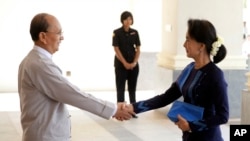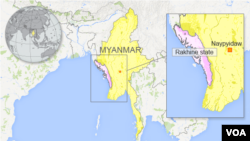Unprecedented talks among Myanmar’s political rivals and powerful army leaders have led to commitments to discuss political reforms and peace talks in the still-fractured country.
Myanmar’s president, the country’s military chief and opposition leader Aung San Suu Kyi were the key figures at a first-of-its-kind meeting at a time when the political reform process appears to have stalled.
Presidential spokesman Ye Htut said the military brass and political rivals at the meeting “agreed to discuss the issue of amending the constitution in parliament, according to the law.”
He did not specify which articles of the constitution would be up for debate.
Constitutional change
The National League for Democracy (NLD) wants to change the constitutional prohibition on anyone becoming president whose spouse or children are foreign nationals.
Suu Kyi’s late husband was British as are her two sons.
Her NLD was victorious in an election in 1990, but the military ignored the results. The NLD boycotted an election four years ago at a time Suu Kyi was under house arrest.
The military retains one-quarter of the legislative seats, allowing it to block constitutional changes. Some lawmakers want to amend the constitution to remove this veto power.
The meeting in Naypyidaw was apparently the first time Myanmar’s powerful armed forces chief, Senior General Min Aung Hlaing, held a discussion with Suu Kyi.
Some expressed skepticism about the gathering, noting only six of the country’s 70 opposition parties were invited and only a few ethnic groups.
The hastily arranged meeting occurred just hours after U.S. President Barack Obama made separate telephone calls to Myanmar President Thein Sein and to opposition leader Suu Kyi.
'Inclusive, credible' election process
The White House said Obama stressed to Sein “the need for an inclusive and credible process” for next year’s elections.
Obama also called on his counterpart to reduce communal tensions and achieve a nationwide cease-fire in the short term.
Obama specifically mentioned the tensions and humanitarian situation in Rakhine state, where minority Muslim Rohingya face discrimination and violence at the hands of the majority Buddhists.
U.S. Ambassador to Myanmar, Derek Mitchell, speaking to VOA’s Burmese news service, expressed concern about the state of reform in the country.
“There are some things that have gone back. Some things are not moving at all. And some things that have advanced,” Mitchell said.
Obama is scheduled to visit Myanmar for November’s ASEAN meeting and the East Asia Summit.
US pressure
Webster University professor Jason Briggs, at the school’s Bangkok campus, said U.S. pressure and the upcoming summit may have influenced the timing for Friday’s unusual meeting in Myanmar’s capital.
“It’s a priority for the United States. I think that they’re getting out ahead, maybe, of this issue being discussed at the summit,” Briggs said.
Myanmar was under absolute military control from 1962 until 2010. Sein, a retired army general, has been president since 2011, following a four-year stint as prime minister.






